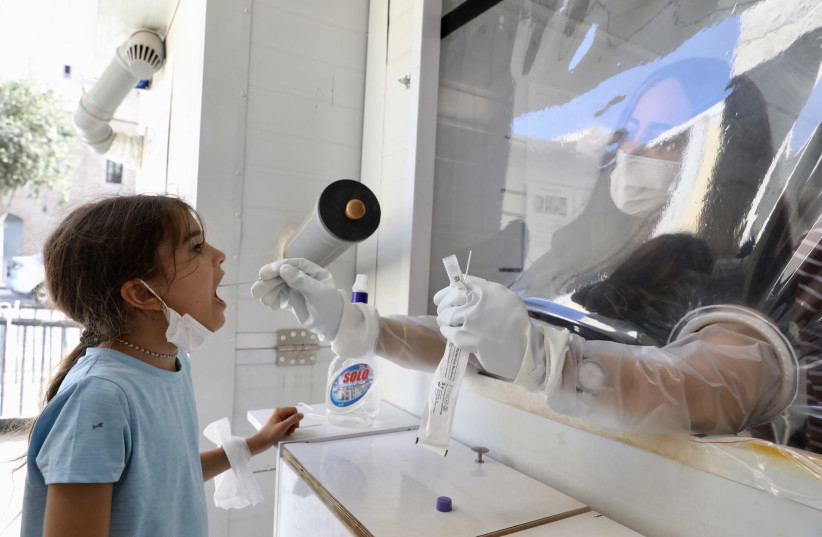The number of new daily COVID-19 infections continues to rise in Israel, with 12,825 new cases reported throughout the day on Monday, according to a Tuesday morning Health Ministry update.
Of some 42,000 officially recognized PCR and antigen tests taken across the country on Tuesday, 30.57% returned a positive result, and the total number of active cases in Israel now stands at 66,054.
The number of serious COVID-19 cases also continues to rise, increasing to 287 patients in serious or critical condition as of Tuesday morning compared to 255 people two days earlier. Of this number, 46 people are intubated and one person is connected to an ECMO machine.
However, the R-rate has shown a steady drop over the last few days, falling from 1.32 earlier last week to where it currently stands at 1.16. While any number over 1 gives cause for concern as it indicates an increasing spread of the virus, the downward trend of the R-number may soon be seen in a decreasing number of daily cases as well.
Over the past seven days, there have been 26 coronavirus-related deaths, bringing the number of such deaths since the start of the pandemic to 10,942.

Hospitals in Israel have once again started to feel the strain of the increased number of COVID-19 cases on top of an already overworked medical system, with several hospitals reporting that they are operating over capacity, both in general and in the internal medicine departments.
Hillel Yaffe Medical Center in Hadera reported on Tuesday that they were operating their internal medicine department at 121% capacity, and Rabin Medical Center-Beilinson Hospital in Petah Tikvah was not far behind, operating at 113% capacity in the internal medicine department, and at 102.4% capacity in general.
On Monday evening, the Knesset Health Committee approved the implementation of supervised at-home antigen testing as a way to increase accuracy when reporting daily infections.
Increased accuracy in daily COVID-19 reports
In recent months, since the introduction of at-home rapid Covid tests, the daily numbers reported by the Health Ministry have become far less accurate, as people are testing positive at home but not taking an authorized follow-up test at a public testing center.
The public testing centers are often inaccessible to people who do not drive and can be difficult to arrive at, especially for people with symptoms, and many do not see the need to take a follow-up test in public if they have already received a positive result at home.
Therefore, the introduction of the supervised at-home test will allow people to continue testing via rapid testing kits while also increasing the accuracy of the reported numbers.
The new supervised testing method will allow people to call a number connected to a testing center, which will then lead them to a live video call. The call center will then confirm the identity of the caller and take their personal details before the person takes a rapid test on camera, upon which the supervisor can record the results.
Alongside this effort to increase the accuracy of the reports, the Health Ministry will be reopening a large number of public testing centers in the coming days after many closed following the end of the Omicron wave.
